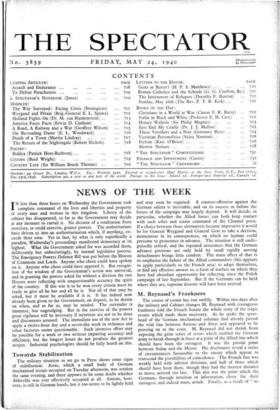Towards Stabilisation
The military situation as we go to Press shows some signs of stabilisation. Arras, which a small body of German mechanised troops occupied on Tuesday afternoon, was retaken the same evening, and there appears to be some doubt whether Abbeville was ever effectively occupied at all. Amiens, how- ever, is still in German hands, but it too seems to be lightly held and may soon be regained. A counter-offensive against the German salient is inevitable, and on its success or failure the future of the campaign may largely depend. It will decide, in particular, whether the Allied forces can both keep contact with each other and retain command of the Channel ports. If a choice between those alternatives became imperative it would be for General Weygand and General Gort to take a decision, momentous in its consequences, on which no layman could presume to pronounce in advance. The situation is still undis- guisedly critical, and the repeated assurances that the German advance positions are only held by small rapidly moving detachments brings little comfort. The main effect of that is to emphasise the failure of the Allied commanders (this appears to apply particularly to the French area) to adapt themselves, or find any effective answer to, a form of warfare on which they have had abundant opportunity for reflecting since the Polish campaign of last September. But if the Germans can be held where they are, supreme disaster will have been averted.


































